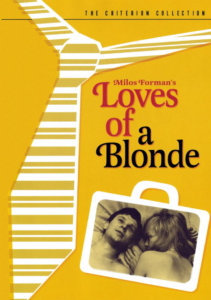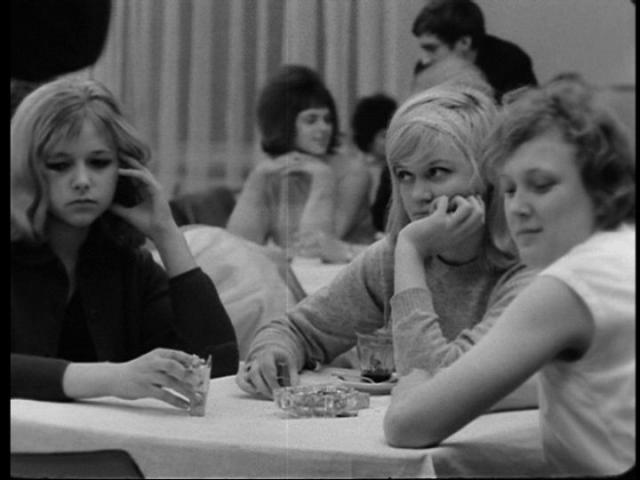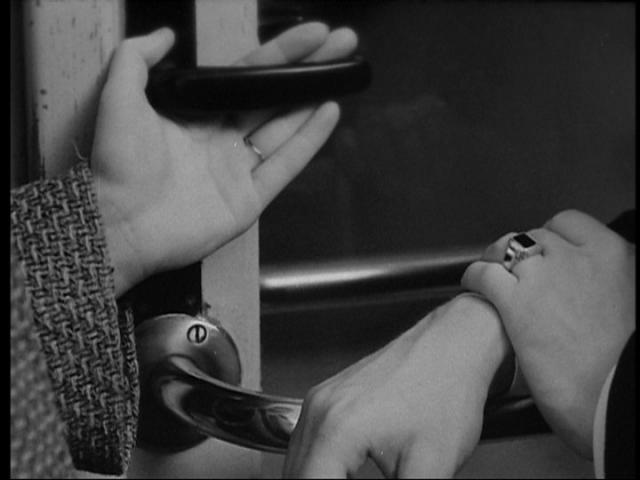“And you — you look like a guitar, too, but one painted by Picasso.”
|

Synopsis:
A young factory worker (Hana Brejchova) in Soviet-controlled Czechoslovakia sleeps with a sweet-talking musician (Vladimir Pucholt) at a company dance, then upsets his parents (Milada Jezkova and Josef Sebanek) the next weekend with a surprise visit.
|
|
Genres, Themes, Actors, and Directors:
- Black Comedy
- Eastern European Films
- Milos Forman Films
- Womanizers
Review:
Milos Forman’s second feature film is, along with its companion piece (1967’s The Firemen’s Ball), proof of his uniquely satirical brand of Czechoslovakian humor. While we can’t help feeling sorry for the dull, overly supervised lives Brejchova and her co-workers lead, it’s impossible not to laugh as Forman sets up scene after scene of darkly comedic devastation. Indeed, Forman is able to mine unexpected humor from the bleakest of corners: even as we watch Brejchova being seduced by someone who clearly has no intention of following through on any of his passion-driven commitments, we know that Pucholt will somehow be made to pay for his womanizing ways. The meticulously edited and scored opening dance sequence — in which a trio of sorry soldiers make a bungled attempt to buy the attentions of Brejchova and her friends — is by far the funniest; from there, the situation becomes increasingly dire, with the denouement at Pucholt’s house particularly harsh. Yet while Loves of a Blonde is undeniably difficult to watch at times, it’s equally impossible to turn away from.
Redeeming Qualities and Moments:
- The hilarious opening dance sequence

- Miroslav Ondracek’s black-and-white cinematography

- Forman’s partly improvised script
Must See?
Yes, as a most satisfying and original film. Listed as a Cult Movie in the back of Peary’s book.
Categories
- Foreign Gem
- Important Director
Links:
|
One thought on “Loves of a Blonde (1965)”
Not a must – well, not when compared to more memorable Czech films from the same period, such as ‘The Shop on Main Street’ and ‘Closely Watched Trains’.
The average ff on the lookout for this film would, I think, be someone curious about director Forman’s early work. I do agree that, here, Forman does indeed “mine unexpected humor from the bleakest of corners” – and the film is perhaps better for having his droll sensibility at the helm.
But, overall, this ‘comedy’, while watchable, is decidedly thin. Certain sequences go on too long, thus pointing up how little is going on here:…
In one unfortunate scene, for example, the seducer musician has way too much difficulty with a window shade. It’s a tired ‘joke’ – and I don’t think this kind of thing happens in life nearly as often as it’s happened on film.
In the admittedly entertaining dance sequence early on, the bumbling, circuitous dialogue of the horny soldiers – while realistic – seems endless. (I admit though, as well, that it’s a scene highlight when the soldiers order a waiter to deliver a bottle of wine to a table of young girls – and the waiter gets the table wrong.)
In the scene between the musician’s parents, the mother fiercely dominates in a one-note way…and we start wondering, perhaps, when these two last had sex. …Perhaps when their son was conceived.
The one sequence that seems to hold the most potential for hilarity (when the musician is forced to sleep with his parents) results in mild amusement.
Unlike the two Czech films mentioned earlier, you won’t find much here that speaks of the political history of Czechoslovakia, though the film does capture a strong sense of a place in time.
I do love the evocative and sustained shot of the countryside when Brejchova hitches a ride to Prague. It’s a few moments of a terrific, if melancholy, mood.
I don’t at all get why this film has/would have a cult following.